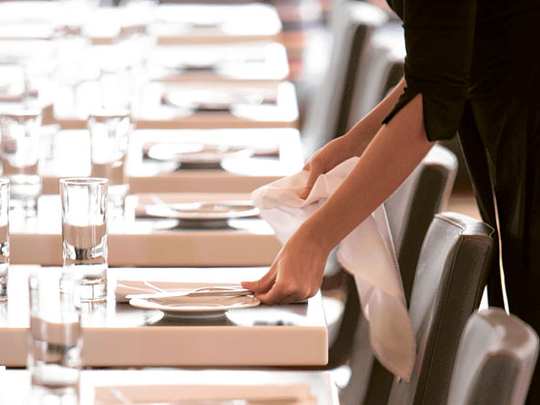
Eating out is among the favoured things to do for UAE residents, and they are doing it more often than before.
Seventy-eight per cent of UAE residents eat at restaurants at least once a week, according to a survey conducted by Gulf-a-la-Carte. Out of 592 respondents, nearly 75 per cent eat out once or twice a week while 3 per cent eat out daily.
There are many reasons people opt for meals prepared for them, whether a fine-dining experience or take-out foods. Among the top reasons is lack of time.
"As working parents, we have less time to prepare a meal; that includes shopping for groceries, cooking and cleaning afterwards," said Fatima, 37.
Deciding what to eat seems a bigger contributor to eating out than expected.
"I worry less about what to cook. When we are eating out everyone picks whatever they want from the menu," said Hoda, 41.
There are clearly ample choices for food options. "The UAE has about 11,000 restaurants, with an expected increase of more than 500 per year. In addition, the planned expansion of 216 hotels, will soon add another 650-700 food and beverage outlets," said Maggie Moore, event director at Gulf-a-la-Carte.
Sharing special occasions with family and friends is worth a trip to a restaurant. "This is great for celebrating happy events or even after a bad day," said Helen, 39.
Some are also looking for indulgence. "I like refined cuisine in elegant restaurants. It feels nice to dress up and be served," said Hala, 33.
The number of restaurants people visit a week varies.
"I eat out every day; I am single, so this is more convenient for me. Even my married friends, who have working partners, eat at restaurants or call for a delivery," said Alaa, 28.
"I eat out twice a week. I prefer cafés on casual outings When I want a really nice treat, I go to a finer restaurant," said Hana, 23. Depending on one's lifestyle, taste and cooking ability, dining out is more cost-effective than preparing your own meals — the cost difference is also beginning to shrink.
"By the time I drive to the market, and spend two hours cooking a meal, I figure I've spent about Dh350-400. Eating out would cost the same," said Ameer, 29.
Eating in restaurants doesn't seem to be greatly affected by the economic crises.
"The high cost of living has impacted many business sectors except restaurants; people still go to restaurants and enjoy food," said M.A., who works in the fast food industry.
Leslie Chavez, manager at Marco Pierre White, finds the flow of people declining in certain seasons rather than being related to the economic crisis.
"All restaurants witness a reduction of their consumers during summer when most of the people are on holiday or during Ramadan, when people prefer family iftar at home," Chavez said.
Yet, there are those who prefer a quick healthy meal at home than eat out. "I can barely eat at the food court, I can't even afford it once," said A.H., 59.
"I can't afford to eat more than twice a month at refined restaurants," Hala said.
Dietitians advise consumers to cut down eating out to just once a month. In a recent study, eating just one restaurant meal per week raised the risk of obesity by 50 per cent. Preparing meals at home allows control of fat, sugar and salt content.
"Eating out is not healthy at all, it's high-cholesterol food, mostly fried using cheap oil and refrying in the same oil; better have a balanced diet at home," said Dr Joseph Kurien, head of cardiology department at Lifeline Hospital.
But, psychologists believe eating out is a way of releasing the stress of work.
"After a tiring week, people want to go out, relieve their stress and talk in a different atmosphere than their homes," said Dr Dolly, a UAE-based clinical psychologist.











